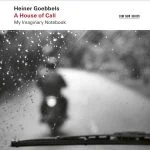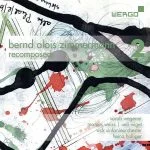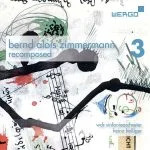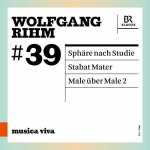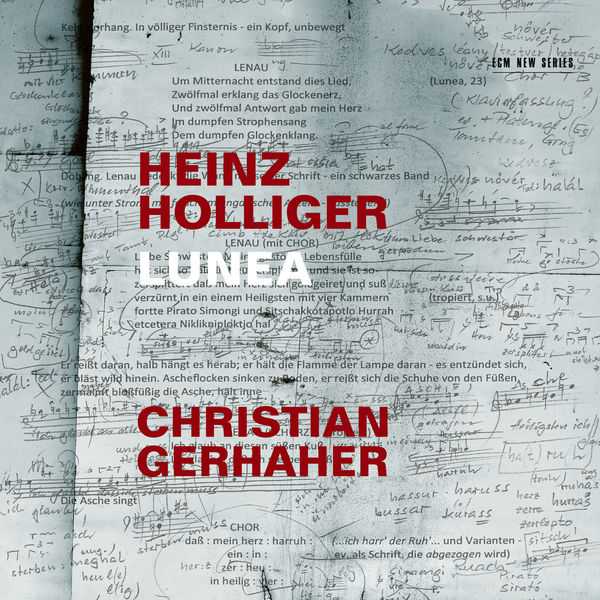

Composer: Heinz Holliger
Performer: Christian Gerhaher, Juliane Banse, Ivan Ludlow, Sarah Maria Sun, Annette Schönmüller, Basler Madrigalisten
Orchestra: Philharmonia Zurich
Conductor: Heinz Holliger
Format: FLAC (tracks)
Label: ECM
Catalogue: 4856322
Release: 2022
Size: 999 MB
Recovery: +3%
Scan: yes
Lunea (Lenau-Szenen in 23 Lebensblättern)
01. Einklang
02. Erstes Blatt
03. Zweites Blatt
04. Drittes Blatt
05. Viertes Blatt
06. Fünftes Blatt
07. Sechstes Blatt
08. Siebtes Blatt
09. Achtes Blatt
10. Neuntes Blatt
11. Zehntes Blatt
12. Elftes Blatt
13. Zwölftes Blatt
14. Dreizehntes Blatt
15. Vierzehntes Blatt
16. Fünfzehntes Blatt
17. Sechzehntes Blatt
18. Siebzehntes Blatt
19. Achzehntes Blatt
20. Neunzehntes Blatt
21. Zwanzigstes Blatt
22. Einundzwanzigstes Blatt
23. Zweiundzwanzigstes Blatt
24. Dreiundzwanzigstes Blatt
Heinz Holliger’s “dream opera” Lunea (2017), subtitled “Lenau-Szenen in 23 Lebensblättern” [Lenau scenes in 23 leaves from a life], with libretto by Händl Klaus, is the Swiss composer’s most complex piece of music theatre to date. It is also a work that continues the sequence of biographical ‘portraits’ delineated in Holliger’s remarkable recordings for ECM New Series.
As Roman Brotbeck points out in an insightful liner essay, Holliger’s focus in his compositions has often been on the work and thought of artistic outsiders. It is the marginal figures who most fascinate him, the ones who followed their creative visions to the brink of madness. He seeks to give voice to their suffering, with music functioning as “a form of solace”. This, broadly, is the impulse that links such distinctive work as the Scardanelli-Zyklus on the late poetry of Friedrich Hölderlin, the opera Schneewittche, after Robert Walser, the Violin Concerto as a tribute to painter Louis Soutter, and the chamber music work Romancendres, a sorrowful protest against Clara Schumann’s burning of her husband’s cello romances. Now comes Lunea.
The opera – which was premiered at Opernhaus Zurich in March 2018 – interweaves strands from the life and mind of Nikolaus Franz Niembsch Edler von Strehlenau (1802-1850), the Hungarian-born Austrian poet who wrote under the name Nikolaus Lenau. Lenau spent some of the last years of his life in an asylum near Stuttgart where he wrote fragmentary texts of almost surrealistic vividness – describing himself, for instance as “an echo nailed to the rock”, and the moon as “a luminous floating tomb”.
Holliger first set some of these inspirations in a song cycle for baritone and piano he called Lunea – 23 sentences by Nikolaus Lenau, which was premiered, with Christian Gerhaher as singer, in 2013. Subsequently, Holliger reworked the Lunea settings into his opera, now integrated, as he put it, “like chorales in a Bach Passion”. Lenau’s words become part of a larger text, shaped by Austrian writer Händl Klaus. In the opera, Gerhaher as Lenau holds centre stage – but other important figures from his life drift into view. These voices each embody several characters, with soprano Juliane Banse portraying both Sophie von Löwenthal, the love of Lenau’s life, and Therese Niembsch, the poet’s mother. Second baritone Ivan Ludlow’s roles include Anton Xaver Schurz, Lenau’s brother-in-law and his first biographer, responsible for preserving many of his writings. Soprano Sarah Maria Sun appears as both Marie Behrends, Lenau’s fiancée, and as famed opera singer Karoline Unger. Finally, mezzo-soprano Annette Schönmüller sings the parts of Lenau’s sister Therese, his friend Emilie Reinbeck, and his lover Bertha Hauer.
“Everything happens as if in a dream”, writes Roman Brotbeck. Discontinuous, following no immediately logical plot. “Yet nothing is blurred; everything is as clear as glass and laid out by Holliger with maximum lucidity”. The 23 “leaves” of the opera unfold associatively, and move backwards and forwards through time. The opera opens in the insane asylum in Döbling. Händl Klaus: “We are inside Lenau’s head – here tabula rasa reigns, in the midst of life, yet full of life; the ground crumbles beneath his feet as he becomes aware of his own downfall”.
Christian Gerhaher conveys the turbulence of Lenau’s mind through the changing emotional landscape of the opera. “The demands of the vocal parts are a little challenging”, Gerhaher allows in a performer’s note, emphasizing that Holliger’s challenges are purposeful: “The work begins to glow, to embody an empathy that seeks to understand and recreate the most minimal stirrings of the suffering poet”.
From his side, Heinz Holliger has noted: “I could not have written the opera without Christian Gerhaher. I’m sure of that. He’s someone very close to me and I was sure he had the sensibility to capture with utmost feeling the unconventional thinking inherent in my opera”.
